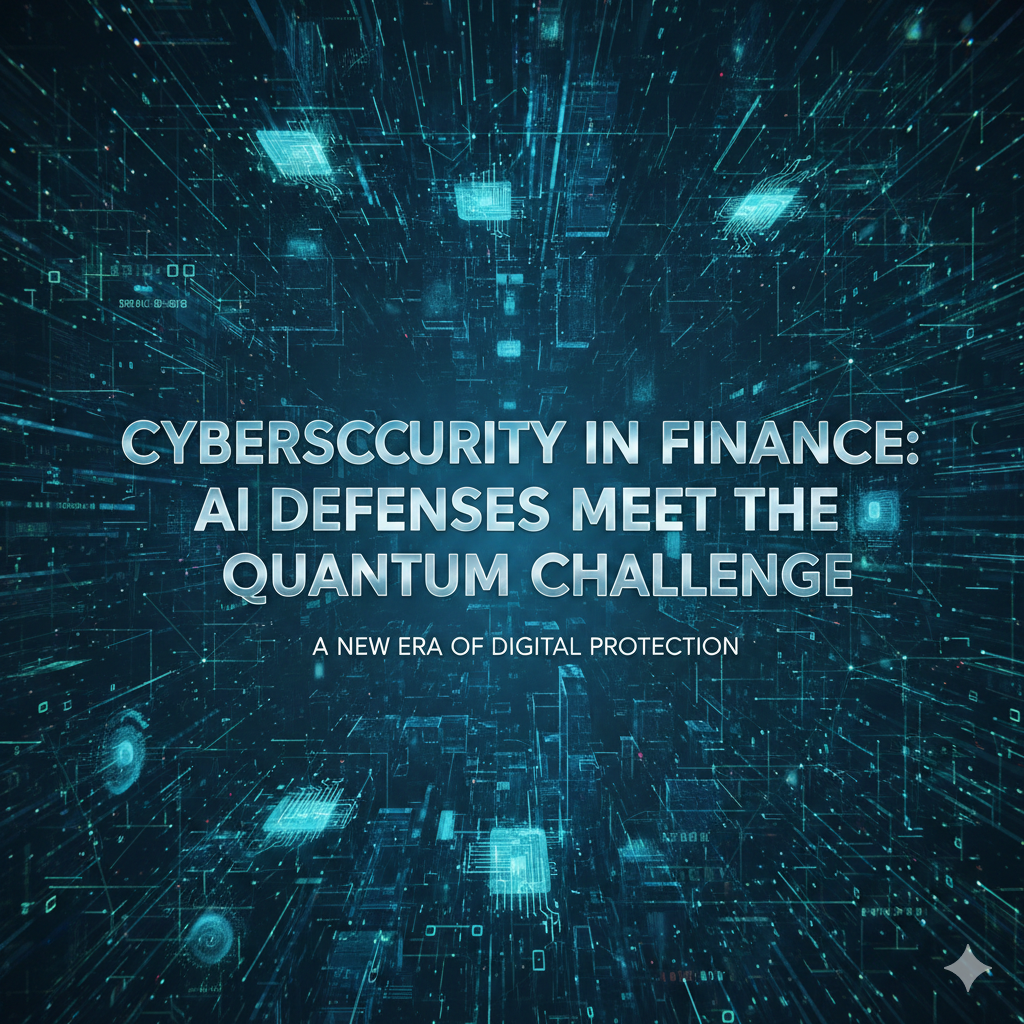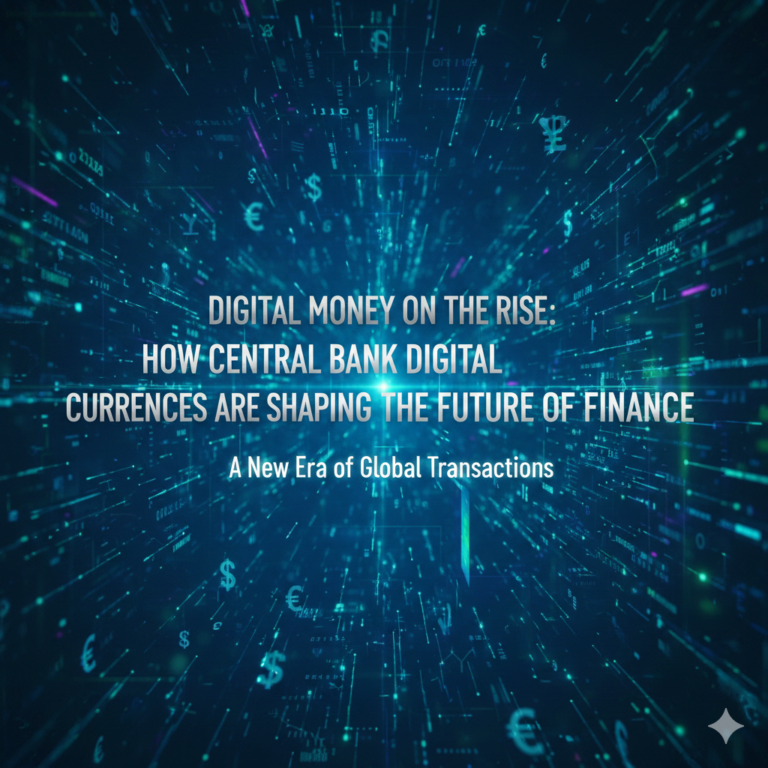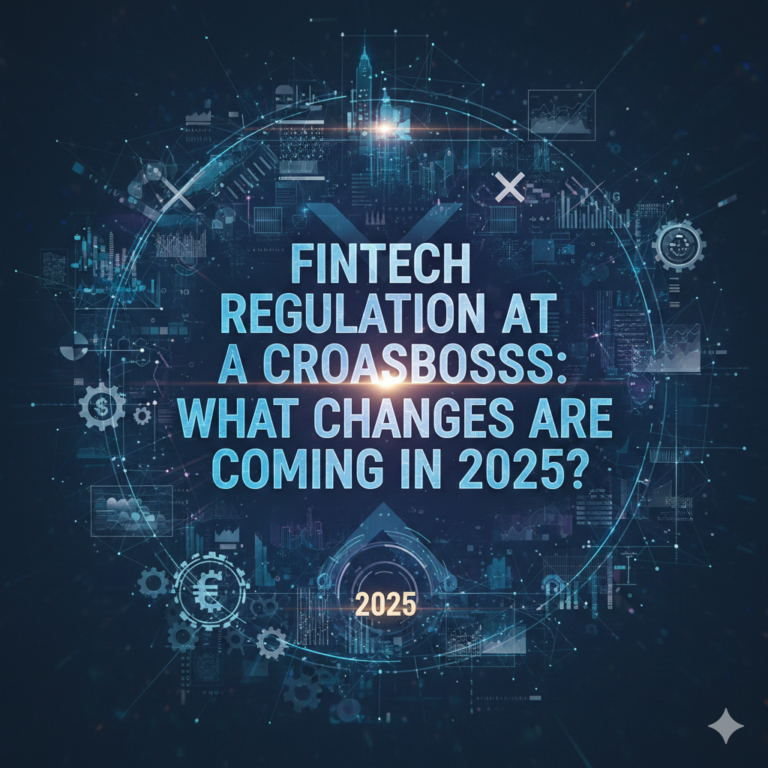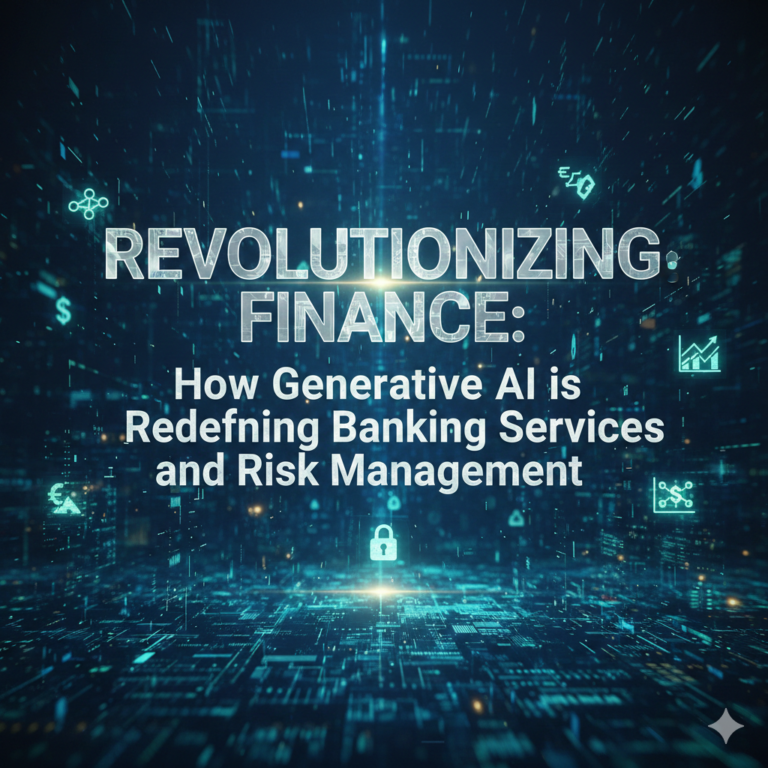Cybersecurity in Finance: AI Defenses Meet the Quantum Challenge
In a world where financial data and money move at the speed of light, cybersecurity is no longer an IT problem — it’s a business imperative. Banks, fintech platforms, payment networks and insurers operate massive digital infrastructures that must stay trustworthy, compliant and secure 24/7. Yet the very technologies that unlock next‑generation financial innovation — artificial intelligence (AI) and quantum computing — are also transforming the threat landscape. AI is enabling attackers to automate and scale attacks with alarming precision, while quantum computing threatens to eventually break the mathematical foundations of today’s cryptography. For financial institutions, understanding this dual‑front challenge isn’t optional — it’s essential.
This article explores how AI defenses are evolving, why quantum computing presents a fundamental shift in risk, and what leaders in finance must do now to protect assets, customer trust and long‑term viability.
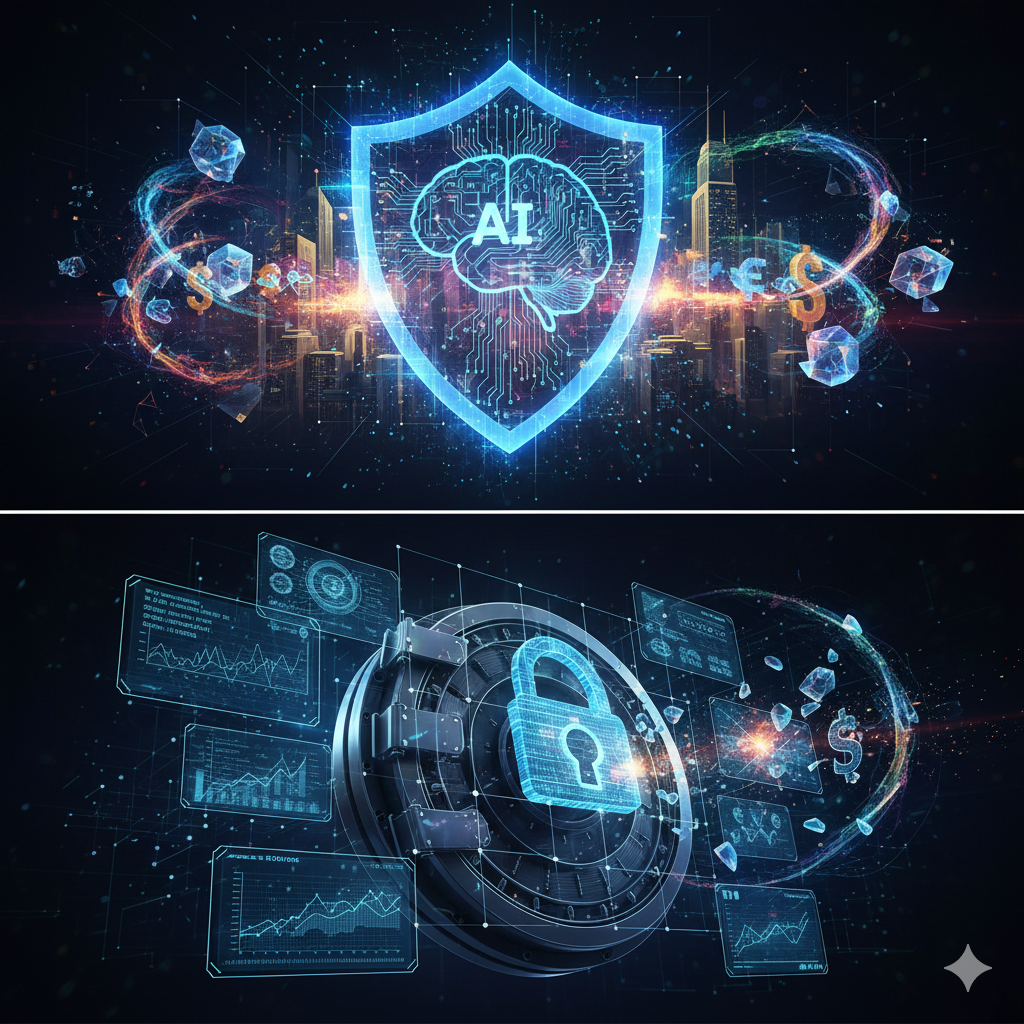
How AI Has Reshaped Cyber Threats in Finance
Artificial intelligence is revolutionizing cybersecurity — but not only for defenders. On the defensive side, machine learning and pattern recognition tools help detect anomalies in transactions and network activity that would take human analysts months to uncover. Financial institutions increasingly deploy AI‑enhanced systems to monitor real‑time payments, identify unusual login patterns, and trigger alerts for suspicious behavior far faster than legacy systems ever could.
Yet attackers are also using AI. Automated phishing campaigns can craft highly personalized messages targeting specific customers. Generative models can design convincing deepfake audio or video to manipulate employees into granting access. Adversarial AI — where attackers probe detection systems to discover blind spots — can evade traditional defenses. This creates a cat‑and‑mouse dynamic where static rules must be replaced with adaptive AI that learns continuously from new attack behaviors.
For the financial sector — a prime target due to its treasure trove of data and money — this means investing in predictive, not just reactive, defense. AI systems must be trained on rich datasets that account for the full diversity of normal behavior, from daily retail payments to multi‑million‑dollar institutional trades. The goal is to reduce false positives while catching truly malicious behaviors faster than attackers can evolve.
SEO keywords used naturally here: AI cybersecurity in finance, AI‑enabled threats, predictive threat detection, adaptive defenses.
Why Finance Is Especially Vulnerable
Why does a bank, a fintech app or an insurer matter to attackers? The answer lies not just in the money, but in the data:
- Personal identification and financial histories of millions of consumers
- Credentials that may unlock other systems
- Payment rails that can move value instantly
- Third‑party integrations that broaden the attack surface
These factors make financial services uniquely attractive. Moreover, regulatory frameworks like the EU’s Digital Operational Resilience Act (DORA) and U.S. banking cybersecurity standards are tightening expectations around detection, reporting and resilience. Compliance alone won’t stop attacks, but it elevates the consequences for failure — from fines and lawsuits to lost trust and attrition of customers.
Attackers leverage AI to scan for vulnerabilities continuously. For example, automated exploitation tools can probe API endpoints 24/7, adjusting tactics based on initial responses. Meanwhile, social engineering — often using generative AI to craft convincing messaging — is the entry point for many breaches. Financial institutions that rely on outdated defenses find themselves in a reactive posture, chasing threats rather than anticipating them.
This dynamic reinforces the need for predictive, data‑driven cybersecurity strategies tailored specifically to financial operations.
SEO terms integrated: financial cybercrime, AI‑driven attacks, financial data protection, cyber resilience in finance.
The Quantum Computing Threat: A New Era of Risk
While AI is already impacting cybersecurity today, quantum computing introduces an entirely different threat vector — one that could upend the cryptographic underpinnings of secure communication and data protection.
Modern encryption schemes — such as RSA and ECC (Elliptic Curve Cryptography) — rely on mathematical problems like factorization and discrete logarithms that are extremely hard for classical computers to solve. But quantum computers, once sufficiently scalable, could solve these problems exponentially faster using algorithms like Shor’s. This means that encrypted messages intercepted today could be decrypted in the future once quantum capabilities mature — a concept known as harvest now, decrypt later.
For financial institutions, this has profound implications:
- Encrypted transaction records and customer data could be at risk if stored and later decrypted.
- Secure communications between branches, partners or cloud providers could be exposed.
- Digital signatures that verify identities might no longer be trustworthy.
Regulatory bodies and cybersecurity agencies are already raising alarms. The UK’s National Cyber Security Centre and others recommend proactive planning for quantum‑resistant systems, even though fully capable quantum machines do not yet exist. Waiting until the technology arrives is too late; transitions of this magnitude take years of planning, testing and coordination across platforms and partners.
SEO keywords here: quantum computing cybersecurity, post‑quantum cryptography, financial encryption threat, quantum safe finance.

Post‑Quantum Cryptography: Preparing for Tomorrow, Today
Recognizing the quantum threat, cryptographers and standards bodies have developed post‑quantum cryptography (PQC) — algorithms designed to resist attacks from both classical and quantum computers. These include lattice‑based, code‑based and hash‑based schemes that rely on mathematical problems believed to be difficult for quantum machines.
For financial organizations, migrating to PQC is not as simple as flipping a switch. It requires:
- Inventorying all cryptographic assets — identifying where encryption is used (data at rest, data in motion, digital signatures, authentication).
- Evaluating quantum vulnerability — determining which systems are at risk under future quantum capabilities.
- Developing a migration roadmap — phasing in post‑quantum algorithms alongside legacy systems.
- Testing thoroughly — ensuring compatibility and performance under real‑world loads.
- Maintaining cryptographic agility — designing systems that can update cryptographic primitives as standards evolve.
This concept of cryptographic agility is becoming a best practice. It ensures that organizations can swap out algorithms when necessary without major system overhauls. Institutions that start this process early gain a competitive advantage: they build resilience and reassure customers and regulators that their data is defended by cutting‑edge security.
SEO focus: post‑quantum encryption, quantum‑resistant security, cryptographic agility, financial cyber risk mitigation.
Synergy Between AI and Post‑Quantum Defense
AI and quantum‑safe strategies intersect in meaningful ways. AI can accelerate the assessment of cryptographic systems by simulating potential attack vectors and identifying weaknesses faster than manual testing. Machine learning models can analyze large codebases to detect insecure patterns or outdated algorithms that human engineers might overlook.
On the defensive front, AI‑driven monitoring is invaluable. Financial institutions deal with massive data volumes — millions of transactions, logins, account changes and API calls every day. Machine learning can build behavioral models that flag anomalies indicating potential breaches, fraud attempts, or internal misuse. When combined with quantum‑ready cryptography, these AI systems form a layered defense that protects both the transport and interpretation of financial data.
There is emerging research into quantum machine learning — models that could run on early quantum processors to detect patterns impossible for classical AI. While still nascent, these technologies hint at future defense capabilities that stay ahead of attackers’ tools.
SEO terms included: AI + quantum cybersecurity, quantum machine learning defense, future finance security, predictive cyber defense.
Practical Steps for Financial Institutions
Implementing a robust, future‑ready cybersecurity strategy is a multi‑year effort. Here’s a practical framework:
1. Comprehensive Risk Assessment
Begin with a detailed audit of all systems, including cryptographic usage, network architecture, third‑party dependencies and data flows.
2. Develop a Quantum Migration Plan
Set milestones for transitioning to post‑quantum algorithms. Prioritize high‑risk systems such as customer authentication, interbank protocols and secure messaging channels.
3. Deploy AI‑Enhanced Monitoring
Invest in machine learning systems that analyze real‑time behavior across the enterprise. Focus on reducing response times and false positives.
4. Adopt Zero Trust Principles
Move away from perimeter‑based security. Authenticate and verify every access request, segment networks and enforce least‑privilege policies.
5. Participate in Industry Collaboration
Cyber threats evolve quickly, and so should defenses. Engage with industry groups, share threat intelligence, and stay aligned with regulatory best practices.
6. Continuous Testing and Validation
Simulate attacks — including AI‑driven scenarios — to test defenses. Use red‑teaming, penetration testing and tabletop exercises to stress‑test your posture.
Conclusion: Secure Finance in an AI‑Quantum World
Cybersecurity in finance is being redefined by two powerful forces: AI and quantum computing. AI amplifies the capabilities of both attackers and defenders, demanding smarter, adaptive security. Quantum computing threatens the foundational cryptographic systems that protect financial data and transactions. Together, these forces compel a new era of strategic planning, where executives must invest in cutting‑edge defenses now to avoid existential risk later.
For leaders in finance, the path forward is clear: embrace AI‑driven security tools, plan and execute a transition to post‑quantum cryptography, adopt principles like Zero Trust, and foster a culture of continuous improvement. The organizations that do will not only protect themselves against tomorrow’s threats but will earn the trust and confidence of customers in an increasingly complex digital world.

